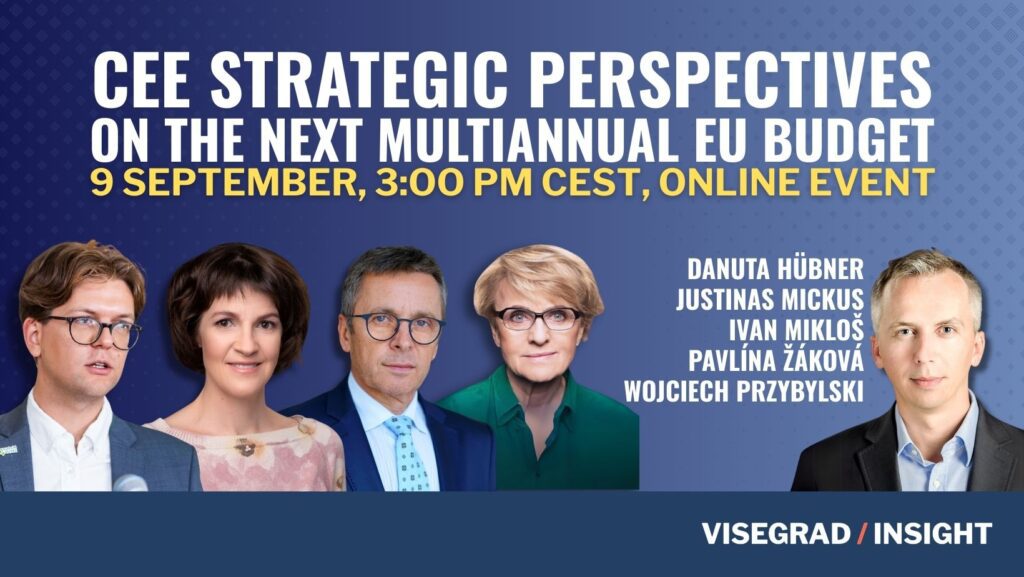Think Tank
Video chats
Online: Is Slovakia Ready to Break Free from Russian Gas?
23 October 2025
3 September 2025
This session, held in advance of our annual Europe Future Forum in Warsaw, will explore the European Commission’s July 2025 proposal and its implications for the region.
Join us on 9 September at 3 PM CEST for an exclusive Zoom discussion on Central and Eastern European perspectives on the EU’s next Multiannual Financial Framework (MFF 2028–2034).
REGISTER FOR THE EVENT BY SCROLLING DOWN OR CLICKING HERE.
Policy leaders from across Central and Eastern Europe will examine strategic objectives for funding the European project, the MFF’s impact on regional development, and its alignment with broader EU priorities. The discussion will address how the proposed budget responds to the unique challenges and opportunities facing CEE countries within the European context.
Get 25% off your Visegrad Insight subscription!
Apply VISEGRADINSIGHT-25 code at the checkout to get an annual subscription for only €30 (€10 off)
CLICK HERE TO SUBSCRIBE.

Danuta Hübner – Professor of economics and politician, with a lengthy academic career and three decades of experience in shaping the European Union as a former European Commissioner for Trade and Regional policy, member of the European Parliament and senior government official in Poland, involved in the country’s transition to the democracy and market economy. As Chair of the Office for European Integration and Minister for European Affairs she was in charge of the accession of Poland to the European Union. She was deputy minister for Industry and Trade, chief negotiator of Poland’s accession to OECD, Head of the Chancellery of the President of Poland. She was also UN Undersecretary General and Executive Secretary of the Economic Commission for Europe in Geneva. In the European Parliament, she was rapporteur for major capital market legislations.
Justinas Mickus – Senior Policy Analyst at the Lithuanian Government’s Strategic Analysis Center (STRATA) and an Associate Analyst at the European Council on Foreign Relations (ECFR) and the Vilnius-based Geopolitical and Security Studies Center. His research mainly focuses on EU politics and integration, as well as trade and economic security policy. His recent and ongoing projects covered Lithuania’s strategic trade dependences, Lithuania’s upcoming EU Council presidency in 2027, and the upcoming EU MFF negotiations. At STRATA, he also serves as the Strategic Foresight lead and conducts studies as well as provides methodological support in government foresight.
Ivan Mikloš – Former Deputy Prime Minister and Minister of Finance of the Slovak Republic (2002-2006, 2010-2012), Deputy Prime Minister for Economy (1998-2002), and Minister of Privatisation (1991-1992). During 2015-2016 he served as a Chief Advisor to the Minister of Finance of Ukraine and as an Advisor to the Minister of Economic Development and Trade of Ukraine. He served as an Advisor to the Prime Minister of Moldova (2021-2022). From March 2022 until June 2024, he was an Advisor to the President of the Slovak Republic in the field of economic policy. Ivan Mikloš was one of the leading figures of economic transformation in the Slovak Republic.
Pavlína Žáková – appointed as Deputy Minister for European Affairs in March 2024, after having served for two years as a Principal Advisor to the Minister. Before, she worked as an economist in the European Commission (2005-2022), including eight years at the Representation of the European Commission in the Czech Republic. In her previous career, she worked at the Ministry of Finance as an advisor to the Deputy Minister for Public Budgets and at the Office of the Government as an advisor to the State Secretary for EU Affairs.
Moderator: Wojciech Przybylski – political analyst heading Visegrad Insight’s policy foresight on European affairs. His expertise includes foreign policy and political culture. Editor-in-Chief of Visegrad Insight and President of the Res Publica Foundation. Europe’s Future Fellow at IWM – Institute of Human Sciences in Vienna and Erste Foundation.
The discussion will last 60 minutes and begin with an on-the-record panel discussion with our speakers, followed by an off-the-record Q&A session.